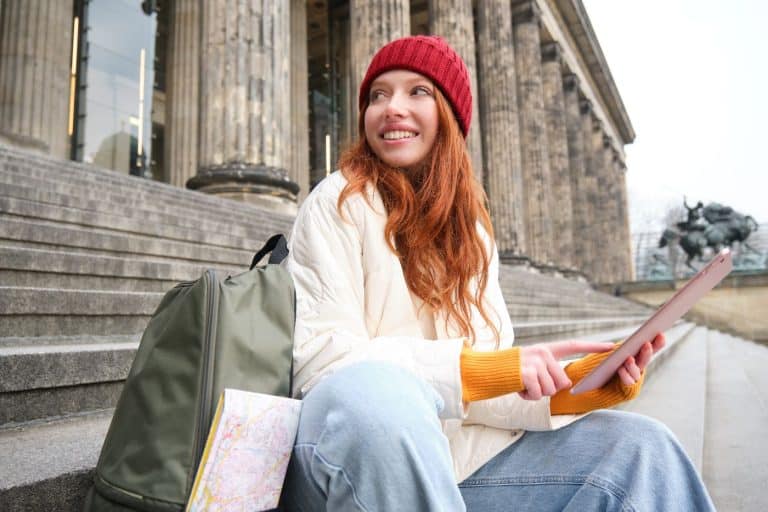Everyone has unique associations with the word “traveling.” Some imagine sandy beaches and a warm sea. Others start thinking about visiting European cities that have an ancient history. No matter what associations you have, traveling is something that can educate and inspire.
However, it is challenging for many students to travel while studying, as many obstacles stand in the way. This article will suggest some possible solutions to overcoming the most common obstacles. So, if you are a student with a huge desire to travel and see the world, keep reading.
You will definitely collect many exciting memories while traveling. This experience is worth sharing in your writing assignments during the upcoming semester. Your essays will have a unique voice and stand out from the rest of the assignments.
You can also get help from companies that offer services of essay writing for college students to organize the material you have. Presenting your ideas and experiences is often more important than the content itself. Here are some more tips on how to combine traveling and studying.
Choose an abroad study program
Enrolling in a school or college abroad is the most obvious choice for those who want to travel and study. This option allows you to see new places, meet new people, and explore a new country. You will be able to dive deep into the culture of locals and explore unique traditions.
It is also an excellent opportunity to learn a new language while being in its environment. It does not mean you should achieve a level of fluency, but learning some basic expressions will be useful. Learning a new language positively impacts the plasticity of your brain. Therefore, you will be able to increase your productivity while studying.
Consider many different options before committing to any of them. The program you choose does not necessarily have to be a Bachelor’s or Master’s degree. First, you can go on an educational tour focusing on a specific subject – history, art, or any other science.
Gather relevant material while traveling

Traveling has a strong correlation with sightseeing. No matter which destination you choose, there will be interesting sights for you to visit. It can be a museum, an art gallery, a historical place, etc. Take notes while you visit such places.
Note down not only the facts you learn but also the emotions you experience. It will help you relive them when writing an essay or a research paper. You can even take an excursion and ask a guide questions.
You can then use this information while coping with writing assignments. If you have enough energy and motivation, start a travel blog and tell others about your experience. This approach can improve your communication skills which are crucial for all college majors.
Go through the process of assimilation
One of the mistakes you, as a traveler, can make is to stay within your bubble of connections and experiences. It means that you refuse to communicate with locals actively, read local literature, and absorb other cultural aspects of the place you are in.
You can lose the chance to broaden your horizon and learn something interesting and even unexpected. Therefore, when you find yourself in a new place, read local literature to gain a more in-depth understanding of its historical and cultural events. Doing so will give you the necessary context to appreciate the traveling destination more.
Meeting new people, in general, and local students, in particular, can give you a chance to exchange knowledge with them and learn something valuable about a foreign educational system. In this way, you most certainly combine traveling and studying.
Boost time-management skills

Your busy studying schedule can stand in the way of your traveling ambitions. No matter how big your passion for adventures can be, it is crucial to prioritize the studying process.
However, it does not mean that you should forget about traveling. It only means that you need to pay close attention to time management. Plan your trips and choose the time between semesters. If you have big traveling plans, choose a minimum number of classes for the upcoming semester to be able to cope with all the necessary assignments.
Use time management techniques like the Pomodoro Technique to maximize study efficiency during short study sessions.
Pay attention to logistics as well. Sometimes choosing low-cost airlines is not the best option as you will find yourself in an airport that is too far away from the city center. Getting to your hotel can take ages and a lot of money.
Learn how to travel on a budget
Apart from time issues, you can experience difficulties with traveling on a budget. As a student, you might not have a stable source of income yet.
Therefore, you must ensure you can afford to travel to the places you want. The first tip is always to carry your student ID. Many attractions, museums, transportation services, and accommodations offer discounts to students. Use the following recommendations to minimize the expenses on your trip.
- Plan your trip. When you plan your journey, you get the chance to buy tickets and book accommodation at a lower price. The earlier you start planning, the better. Also, during this stage, you can opt for destinations where the cost of living and travel expenses are lower, such as Southeast Asia, Eastern Europe, or some parts of South America. Also, you can consider using platforms like Couchsurfing to find locals who are willing to host travelers for free.
- Choose the right time. Avoid traveling during peak tourist seasons when prices for flights, accommodations, and attractions are higher. Without a doubt, traveling to Spain during summer, for example, has many benefits as you can enjoy the beautiful sea and swim in it for as long as you want. However, you can enjoy the architecture and art galleries during winter and spend less on your trip.
- Know where to eat. Opt for affordable local eateries and street food, which save money and offer an authentic culinary experience. Alternatively, you can choose accommodations with kitchen facilities and cook your meals to save money on dining out. Also, alcohol expenses can add up quickly. Consider reducing your alcohol consumption to save money.
- Think about what you buy and how you buy it. Be mindful of your souvenir spending. Choose meaningful, small items instead of expensive ones. Be cautious of touristy areas where prices tend to be higher. Venture to local neighborhoods for more budget-friendly offers. On top of that, research the most cost-effective way to handle money at your destination. Sometimes cash is a more preferred method from a psychological point of view. When you hold physical money, you realize how much you are spending.
- Consider different transportation options and attractions. Using public transportation instead of taxis or private transfers is a good idea that helps you save on commuting expenses. Also, you can explore the destination by walking or biking. This approach is both budget-friendly and a great way to immerse yourself in the local culture. Do preliminary research on the available attractions. Look for free or low-cost events, parks, and museums.
Choose a travel destination wisely
If you plan to continue studying during your trip, choose a destination with a good internet connection, comfortable study spaces, and library access. Some countries can’t boast of having great 4G or 5G coverage.
If possible, choose travel destinations that align with your studies. For instance, if you’re studying marine biology, visit coastal areas with diverse marine life. When planning your trip, analyze how much time you are going to spend on the road.
Perhaps, you can take textbooks to continue reading, listening to educational podcasts, and preparing for exams.
Using the downtime to catch up on reading or engage in online courses is always a good idea. Also, if you are in a study group, discuss the possibility of meeting online. Carry digital versions of your textbooks, notes, and study materials to lighten your luggage and allow easy access to electronic devices.
Ensure you clearly understand how to get from point A to point B and look for the most convenient route online.
Work on your resilience
Traveling is always full of surprises. Sometimes they are pleasant, and other times they are not. You have to be prepared for unexpected changes in your travel plans and adapt your study schedule accordingly.
Everything depends on your perception of the situation. If your flight is canceled or you take the wrong bus, it is an exciting part of the journey. It might be challenging to look at these situations from this perspective at first. However, it is crucial to stay calm and analyze the options you have. You can try noting down the algorithm of your actions in case anything goes wrong.
Then, it will be easier to adapt and avoid excessive stress. Doing so helps you improve your resilience skills which are essential for a student. Student life is also full of surprises. Navigating unfamiliar environments and solving unexpected problems while traveling sharpens your critical thinking and adaptability skills.
Why Traveling Is Useful for Students
Now that you have many tips on how to combine student life with traveling, it is worth mentioning the benefits students get from this process. There is much more to traveling than the excitement of seeing new places.
- Real-world context. You can see places you’ve read about in textbooks with your own eyes. Luckily, there are still many historical sights around the globe that can tell you a lot about ancient history. You can learn about the customs and see artifacts from past centuries. It is a completely different experience than reading about random facts in a textbook.
- Better communication skills. Interacting with people from diverse backgrounds hones your communication skills, making you a more effective communicator in academic and social contexts.
- Global perspective. Seeing different cultures and societies encourages a global perspective, which can be crucial in international relations, business, and social sciences. The more things you see and feel while traveling, the wiser you become.
- Independence and responsibility. Traveling independently builds responsibility, self-discipline, and time management skills that are applicable to your academic life. When you meet one-on-one with real-world problems and learn how to solve them, your self-esteem grows. You can overcome any academic obstacle now.
